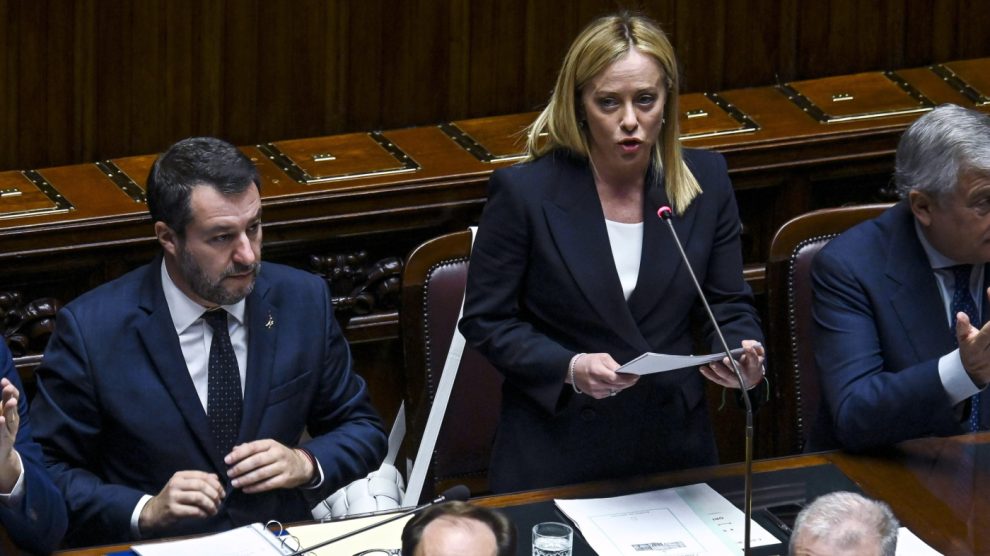On Italy’s positioning. The country “is entirely part of the West and its alliance system, a founding state of the European Union, the Eurozone and the Atlantic Alliance, a member of the G7, the cradle […] of Western civilisation and its system of values based on freedom, equality and democracy.”
On Ukraine and NATO. PM Meloni promised that “Italy will continue to be a reliable partner of the Atlantic Alliance, starting with supporting the brave Ukrainian people who oppose the invasion of the Russian Federation.”
- The Alliance, she said, guarantees “a framework of peace and security that we too often take for granted,” she added. “It is Italy’s duty to contribute fully to it because, whether we like it or not, freedom has a cost. That cost for a State is its capacity to defend itself and the reliability it demonstrates in the framework of the alliances to which it belongs.”
- In her speech, she never used the word “NATO” but referred to it as the “Atlantic Alliance”.
On Italy within the EU. “I am not unaware of the curiosity and interest in the posture that the government will hold towards the European institutions. Or even better, I would like to say inside the European institutions because that is where Italy will make its voice heard, loudly, as is proper for a founding nation. Not to sabotage […] but to help direct it towards more effective responses in reaction to crises and external threats.”
- “We do not conceive the EU as an elitist club with first-class and second-class members, or worse, as a joint stock company run by a board of directors with the sole task of keeping the accounts in order,” she added.
- “Those from abroad who say they want to watch over Italy are not disrespecting this government or me. They disrespect the Italian people, who need no lessons.” This was a reference to comments from French ministers, who promised to monitor Italy and the rule of law in the wake of Ms Meloni’s electoral victory.
- When they met on Sunday, French President Emmanuel Macron reiterated that promise but added he would judge her government by its actions. His approach was indicative of the double need to maintain solid cooperation between the two countries while keeping some distance from Ms Meloni, who is reminiscent of France’s own Marine Le Pen, so as to avoid propping up the latter – albeit indirectly.
On her vision of the EU, “the common house of the European peoples” that must be able to “face the great challenges of our time, starting with those that the member states can hardly face alone”: trade agreements, supply of raw materials and energy, migration policies, geopolitical choices, and the fight against terrorism.
- “A common European home certainly means shared rules, also in the economic-financial sphere. This government will respect the rules currently in force and at the same time offer its contribution to change those that have not worked, starting with the ongoing debate on the reform of the Stability and Growth Pact.”
On China and the ecological transition. Ms Meloni’s stated approach is that of “accompanying companies and citizens towards the green transition without handing ourselves over to new strategic dependencies and respecting the principle of technological neutrality.”
- The nod to “strategic dependencies” cannot be other than a reference to Europe’s (and Italy’s) growing dependence on China’s green tech industry, especially on solar and automotive.
- She rebranded the Ministry of Ecological Transition into the Ministry of the Environment and Energy Security – a move that exemplifies her government’s likely approach to the matter.
On controlling migratory flows. Her stated goal is to “stop illegal departures” and “finally break the trafficking of human beings in the Mediterranean.” Touching upon the naval blockade, a controversial talking point in the past months, she noted the intention of “recovering the original proposal of the UE’s Sophia naval mission” that featured the never-implemented “blockade of departures of barges from North Africa.”
- “We intend to propose it at the European level and implement it in agreement with the North African authorities, accompanied by the creation of hotspots on African territories, managed by international organisations, where we can screen asylum requests and distinguish those who have the right to be received in Europe from those who do not have that right.”
- “In no way do we intend to question the right of asylum for those who flee war and persecution. Our aim is to prevent Italy from continuing to have its immigration selection made by the smugglers,” she noted.





